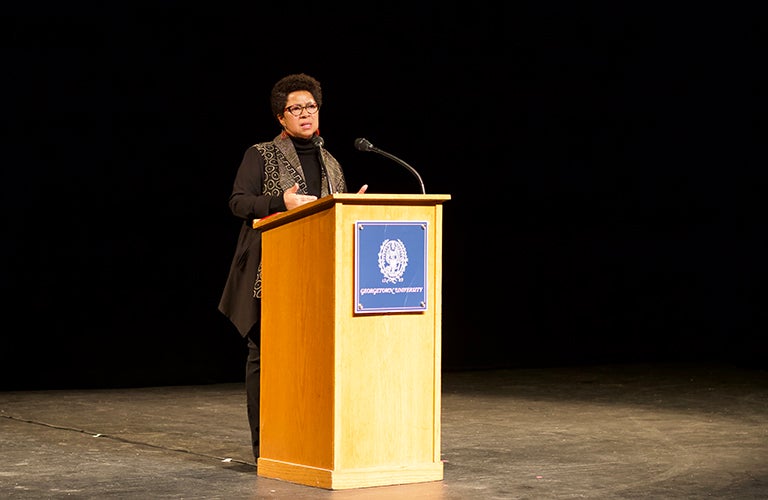Georgetown Hosts Conference on Black Cultural Expression
February 1, 2019 — The Georgetown College Departments of African American Studies and Performing Artshosted a conference last week on black cultural production and the ways activism engages environments.
“Breaking Boundaries, Created Spaces” featured a keynote address by Barbara Ransby, professor of gender and women’s studies and African American studies at the University of Illinois at Chicago.
Department of Performing Arts Chair and conference organizer Professor Soyica Colbert said that the event’s organizers were very intentional when picking the speaker, whose address is named for Civil Rights Movement organizer Ella Jo Baker.
“Our department created the Ella Jo Baker Distinguished Lecture to commemorate Ella Jo Baker’s life as a theorist, a community organizer, a teacher and a visionary,” said Colbert, who is also an associate professor in the Department of African American Studies. “We do this by recognizing an illustrious scholar, or an outstanding performer, or an eminent community organizer, and we recognize their intellectual, political, or cultural work. We ask this distinguished guest lecturer to give a signature lecture that assesses and reviews African American progress towards defining or realizing racial, social or economic justice.”
Professor Rosemary Ndubuizu of the Department of African American Studies cited Ransby’s scholarly work, which has helped carry on Baker’s legacy.
“As one of the country’s leading scholars in race, gender, social justice and social movements, Dr. Barbara Ransby continues Ella Jo Baker’s tradition of activism and political study,” she said.
Ransby’s speech centered around the history of the Black experience and the potential for collective action.
“I want to do three things this evening — I want to talk about our troubled past, I want to talk about our painful and complicated present, and I want to talk about a possible revolutionary future,” she said.
After her speech, Ransby took questions ranging from how to be politically active as Black American and what role restorative justice should play in society. Student reception was positive.
“I thought the event was fascinating,” Toella Pliakas (F’21) said. “I really appreciated hearing [Ransby’s] interpretation of the Civil Rights Movement’s effect on the present day movement for Black lives. I thought she gave real and practical advice on how young people could make real political differences for Black Americans.”
On Friday, the conference hosted three panels featuring professors from Brown University and John Hopkins as well as activists from Chicago.
The panels included discussions of how race and expression could be integrated into the spaces of art and protest. Scheherazade Tillet, one of Friday’s panelists and the Executive Director of Chicago’s A Long Walk Home, showed a video of how her organization had helped a community in Chicago gather together for a day of performance in a park where Rekia Boyd, a young black girl, was shot by a police officer. She explained how it was their way of taking back the space and making their own again. Other panelists shared similar stories about how their work in art had allowed them to make their own statements in the matters of racial justice and equality.
The conference as a whole was meant to add to the discussion of how to proceed in the arenas of black expression, performance and activism, something Ransby pointed out was vitally necessary.
“Whatever the path we take, there has to be a reckoning with our troubled past, an acknowledgement of our differences, a prioritization of the most vulnerable among us and a way that we make peace with the rest of the world,” Ransby said. “A daunting set of challenges, but ones we cannot afford to turn away from.”
